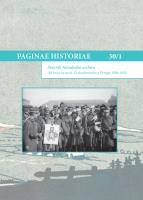Obchodně-politické vztahy Rakouska a Československa bezprostředně po válce (1918–1920)
Business and Political Relations of Austria and Czechoslovakia Immediately after the Great War (1918–1920)
Author(s): Tomáš MoricSubject(s): History, Economic history, Interwar Period (1920 - 1939)
Published by: Národní archiv
Keywords: Czechoslovak-Austrian relations; trade relations
Summary/Abstract: The article deals with the development of business and political relations between the Czechoslovak and Austrian republics immediately after the Great War with an emphasis on their formative effect for the subsequent political and economic orientation of the two states with respect to the fact that it was their most significant business and political relationship within the newly built economic contacts in the wider Central European area and its geographic and geopolitical based on the Treaty of Versailles. The article is especially interesting because it represents a relatively unique 20th-century phenomenon of the dramatic collapse of a fully integrated state into several independent parts which instead of the general consolidation of the post-war situation in Central Europe led to the establishment of a certain power vacuum, rather unwanted and dangerous for the future of pan-European security of the crucial space. The contribution elucidates the development of Czechoslovak-Austrian business and political relations in the context of the fact that after the war, the economy was based on rationing, and the first business and political relations between the two states took place on the basis of compensation agreements. In this context, the author emphasises that Prague used the fact that in addition to its undeniable material advantage over Austria, Czechoslovakia also had the upper hand in international politics for its affiliation to the victorious war coalition and asserted its political interests, especially the recognition of Czechoslovak control over the Czech lands with the German-speaking population that came under Czechoslovak administration prior to signing the Treaty of Saint-Germain. The author further highlights that Edvard Beneš was convinced about the strong position of Czechoslovakia regarding the failure to meet the agreed sugar and coal supplies to such an extent that he found it unnecessary to increase the supplies even when the Entente Powers exerted international pressure. Contrarily, he responded to their pressure with the ‘carriage’ politics that changed only under the weight of the dropped prices of the commodities in the world market at the end of 1920, i.e. purely from economic and not political reasons.
Journal: Paginae Historiae
- Issue Year: 30/2022
- Issue No: 1
- Page Range: 434-453
- Page Count: 20
- Language: Czech

